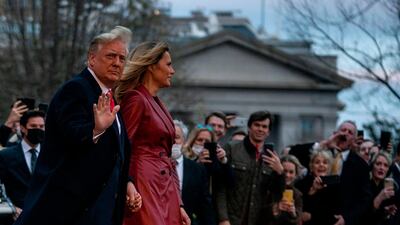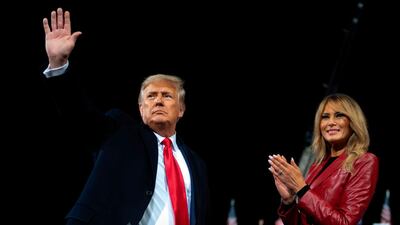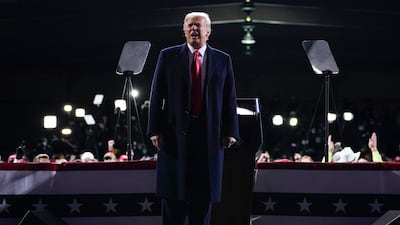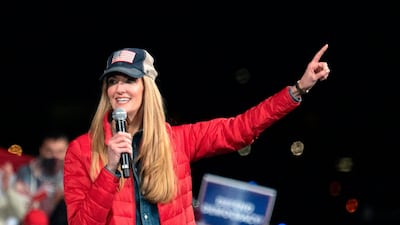US President-elect Joe Biden's 2020 campaigns – both in the Democratic primaries and when he beat departing President Donald Trump in the general election – were built on the promise of national reconciliation and a return to the political centre. That was always going to be a tall order, but the post-election aftermath is virtually guaranteeing that partisan antagonism, and concomitant governmental gridlock, will be worse than ever.
While Mr Biden says he wants the deeply divided country to begin to reunite around shared principles and goals, Mr Trump is pushing vigorously, and effectively, to promote extreme outrage among his supporters. Reconciliation cannot begin if much of the country believes that the election was "stolen", Mr Biden is a usurper and Mr Trump is the "real president".
Mr Trump and his allies have presented no credible evidence of meaningful irregularities and lost over 50 court challenges on both procedural and factual grounds.
Yet the constant drumbeat of allegations, however fact-free, has by now embedded the myth of the "stolen election" into the belief system of most Republican voters, according to recent polls. It threatens to become a defining creed.
His final month in office could be especially tumultuous. Numerous major newspapers reported that, on Friday, Mr Trump held what was surely one of the most bizarre and disturbing meetings ever in the White House.
Among the ideas seriously contemplated by the President were declaring martial law and using the military to force swing states to redo their elections so that Mr Trump can “win".
That amounts to serious consideration of a coup d'etat by a sitting US president. Military leaders yet again felt obliged to state publicly that they would not use force to keep him in power.
One adviser describes Mr Trump's current attitude as seeking any ideas "to stay in office past January 20". At the meeting he also pondered an executive order seizing control of state voting machines.
Mr Trump will probably never concede defeat and leave the presidency. But the presidency will leave him on January 20 when Mr Biden is inaugurated.
It seems far-fetched for a former president to retain an iron grip on his party without the power of the White House. But Mr Trump could well pull it off. He is likely to go into heavy-duty campaign mode on, or even before January 20, and will almost certainly hold some sort of "Trump 2024" rally at the same time as Mr Biden's inauguration. Elected Republicans will probably be held to account for which event they attend.
Immediately after the election, many leading Republicans argued that not publicly acknowledging Mr Biden's victory was merely a way to humour Mr Trump and allow him to ease into a more gracious exit.

This assumption predictably backfired, as they failed to understand that Mr Trump’s masterful demagoguery would trap them into tacitly supporting, or at least not openly contradicting, the "stolen election" mythology. And now that this myth is dominating the political consciousness of many Republican voters, it is becoming an article of faith and a definitive litmus test. That is precisely how Mr Trump will attempt to maintain control of his party.
It sets a new standard whereby ever conceding defeat in an election is anathema for Republicans. Co-operation with the Biden administration may often seem immoral treachery. It might even be difficult for Mr Biden to secure Senate approval for some cabinet appointments, unless Democrats improbably win both Georgia Senate run-off elections on January 5 and gain the narrowest possible control of the Senate.
Challenges to reconciliation will not come just from Republicans. The emerging Biden cabinet is decidedly centrist, angering many left-wing Democrats who never trusted him anyway.
Centrists hoped Mr Trump's unpopularity would give Democrats a huge victory in Congress along with the White House. Any leftist insurgency could then be contained in the glow of a decisive victory under centrist leadership. But while Mr Biden's win was comprehensive, Democrats actually lost seats in the House of Representatives and probably will not control the Senate. Leftists are already asserting themselves and they, too, will be militating against compromises as betrayals of principles.
As for Republicans, their determination to not co-operate is clearly signalled in the latest coronavirus relief bill negotiations. These have been complicated by a depressingly predictable though sudden resurgence of Republican concern about budget deficits, which were blithely dismissed during the Trump presidency.
They have also been moving to hamstring the powers of the Department of the Treasury and Federal Reserve Bank to direct disaster relief and recovery, again attempting to hobble the incoming administration. The national economy may again fall victim to cynical partisan politicking.
Republicans are drifting into an oppositional hysteria that may make the "tea party" extremism of the Barack Obama era look calm and conciliatory.
Mr Trump has often trafficked in conspiracy theories, beginning his political career as the main champion of "Birtherism", the crude fabrication that Mr Obama was born outside the US and hence ineligible for the presidency. Now he is leaving his own presidency effectively promoting the ideas that not only is Mr Biden an illegitimate president, but the entire US democratic system is a fraud.
Republican leaders must either find a way to convince their voters that this not actually true or remain in the thrall of Mr Trump for at least the next two years . Almost none of them have even begun to try. Instead, they are allowing their party to become defined by a set of paranoid and dangerous delusions. As ever, they seem to have an inexplicable confidence that they can ultimately control such combustible elements. Or maybe they just do not care.
It is not impossible for Mr Biden to find a way to overcome all of this and really begin American national healing and a centrist resurgence. Much of the public would rejoice at that, but too many political actors have every incentive to oppose it.
His challenge looks far steeper today than immediately after the election. Back then, it merely appeared daunting.
Hussein Ibish is a senior resident scholar at the Arab Gulf States Institute and a US affairs columnist for The National






























